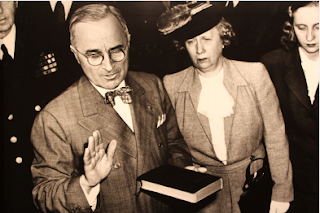Though
FDR’s preference was for his running mate in 1944 was Supreme Court
Justice William O. Douglas, party bosses wanted Harry Truman to keep
the support of conservatives. Truman is said to have responded through
intermediaries “Tell him to go to hell.” But, under the advice of the
party bosses, President Roosevelt decided on Truman, who was then
pressured to accept the nomination.
Roosevelt and Truman did not communicate much during the campaign or even after they were sworn in. After one meeting with the President, Truman said “He does all the talking and he talks about what he wants to talk about, and he never talks about anything you want to talk about, so there isn’t much you can do.” Truman is said to have disliked Roosevelt, believing him to be dishonest.
President
Truman asked Mr. Roosevelt’s cabinet to stay at their posts. He said he
would “carry on as he believed the President would have done.” In time,
however, he began to replace many of Roosevelt’s cabinet with his own
appointees.
Following in Roosevelt’s footsteps was a difficult task, as Roosevelt had the charisma and public-speaking skills that had won him the election four times in a row. Truman didn’t have these skills, but he was easy for people to relate to. He came from a humble background and the people felt he was both honest and hard-working.
Roosevelt’s plans for the US post-WWI included significant cooperation with the Soviet Union, Great Britain, and China. During his presidency he put a great deal of effort into building a relationship with the Soviet leader, Joseph Stalin. These plans and expectations would affect the course of Truman’s policy making decisions. Taking office at the end of the war, Truman was left to deal with big foreign policy decisions. The most significant of these was the decision to drop atomic
bombs on Japan. Under his leadership, the US undertook a great deal of commitments and became significantly more engaged in global issues. While he likely did not intend to transform US foreign policy so drastically, the circumstances at the time demanded that policy adapt.
Sources:
Krock, Arthur. "President Roosevelt Is Dead; Truman to Continue Policies; 9th Crosses Elbe, Nears Berlin." Editorial. The New York Times 13 Apr. 1945: 1. On This Day. The New York Times. Web. 24 June 2015. <http://www.nytimes.com/learning/general/onthisday/big/0412.html>.
Miscamble, Wilson D. "Harry S. Truman, the Bomb, and the Transformation of U.S. Foreign Policy." John O'Sullivan Memorial Lecture Series (2008): 4-7. Florida Atlantic University. Web. 24 June 2015. <http://www.fau.edu/osullivan/images/Wilson_D__Miscamble_pub.pdf>.
"Harry S. Truman." The White House. The White House, n.d. Web. 24 June 2015. <https://www.whitehouse.gov/1600/presidents/harrystruman>.
"What Franklin Roosevelt & Harry Truman Thought of Each Other." Carl Anthony Online. N.p., 25 June 2012. Web. 25 June 2015. <http://carlanthonyonline.com/2012/06/25/what-franklin-roosevelt-harry-truman-really-thought-of-each-other/>.
"Biographical Sketch Harry S. Truman." American President: Harry S. Truman: Domestic Affairs. Miller Center, n.d. Web. 26 June 2015. <http://millercenter.org/president/truman/essays/biography/4>.




Jacqueline, this is an outstanding presentation. You have gathered excellent materials and weaved them into a cogent, coherent narrative. You give a good sense of the ways in which FDR kept him at more than arm's length—surely an dereliction of duty given the fact that Roosevelt knew how sick he, Roosevelt, had become over the last year. And you also well communicate Truman's own sense of inadequacy but also determination to forge ahead. He did, after all, become one of the giants of the 20th century and stands fully equal in stature and importance to Roosevelt. One aside: I recall in the 1970s, when Nixon had disgraced the presidency and Ford had taken over (and seemed weaker than weak...althought that wasn't true) that the pop group Chicago released a song called "American Needs You, Harry Truman." This goes to the estimation in which he was held by the mid 1970s. His reputation has only grown since then.
ReplyDelete